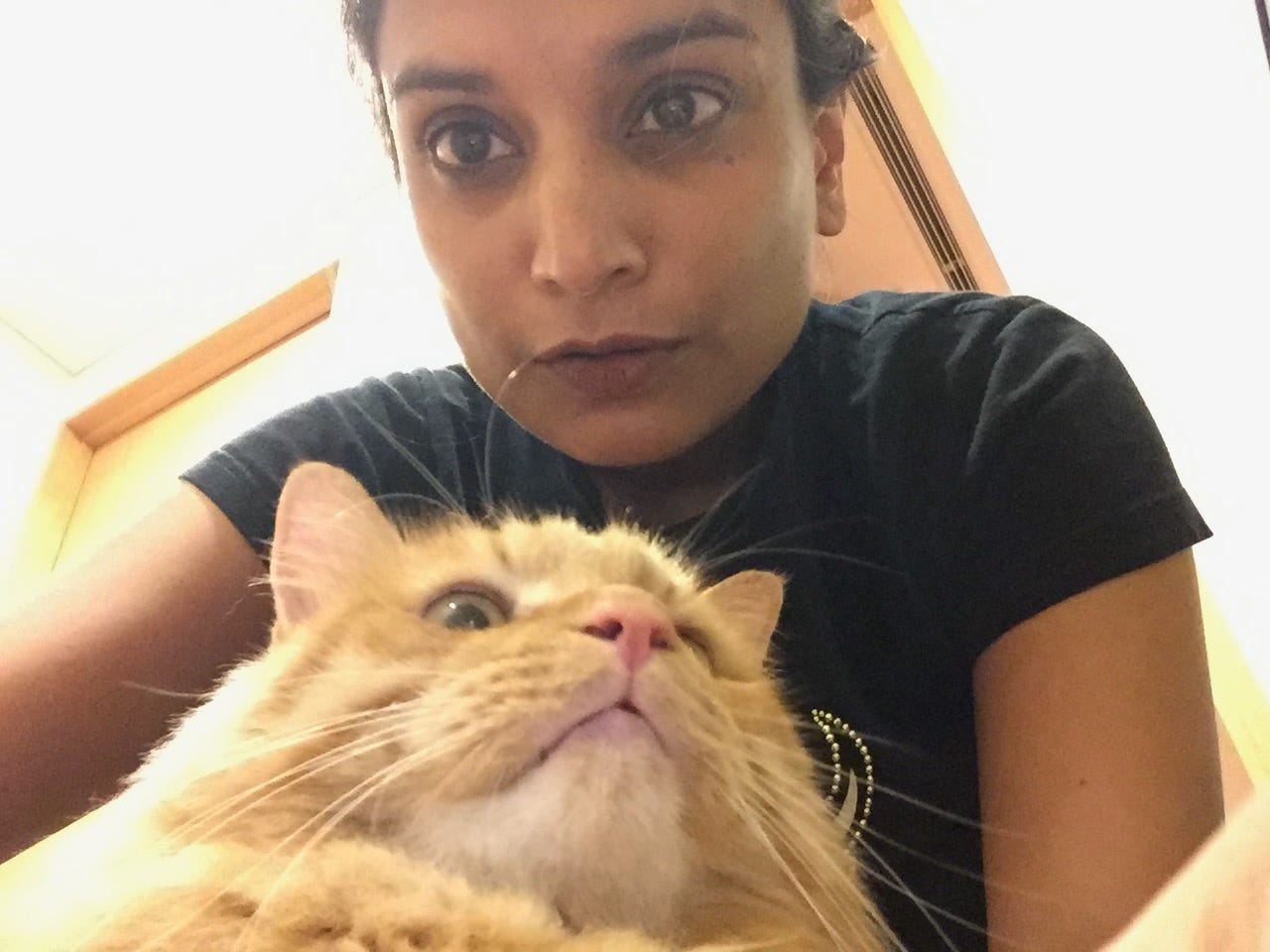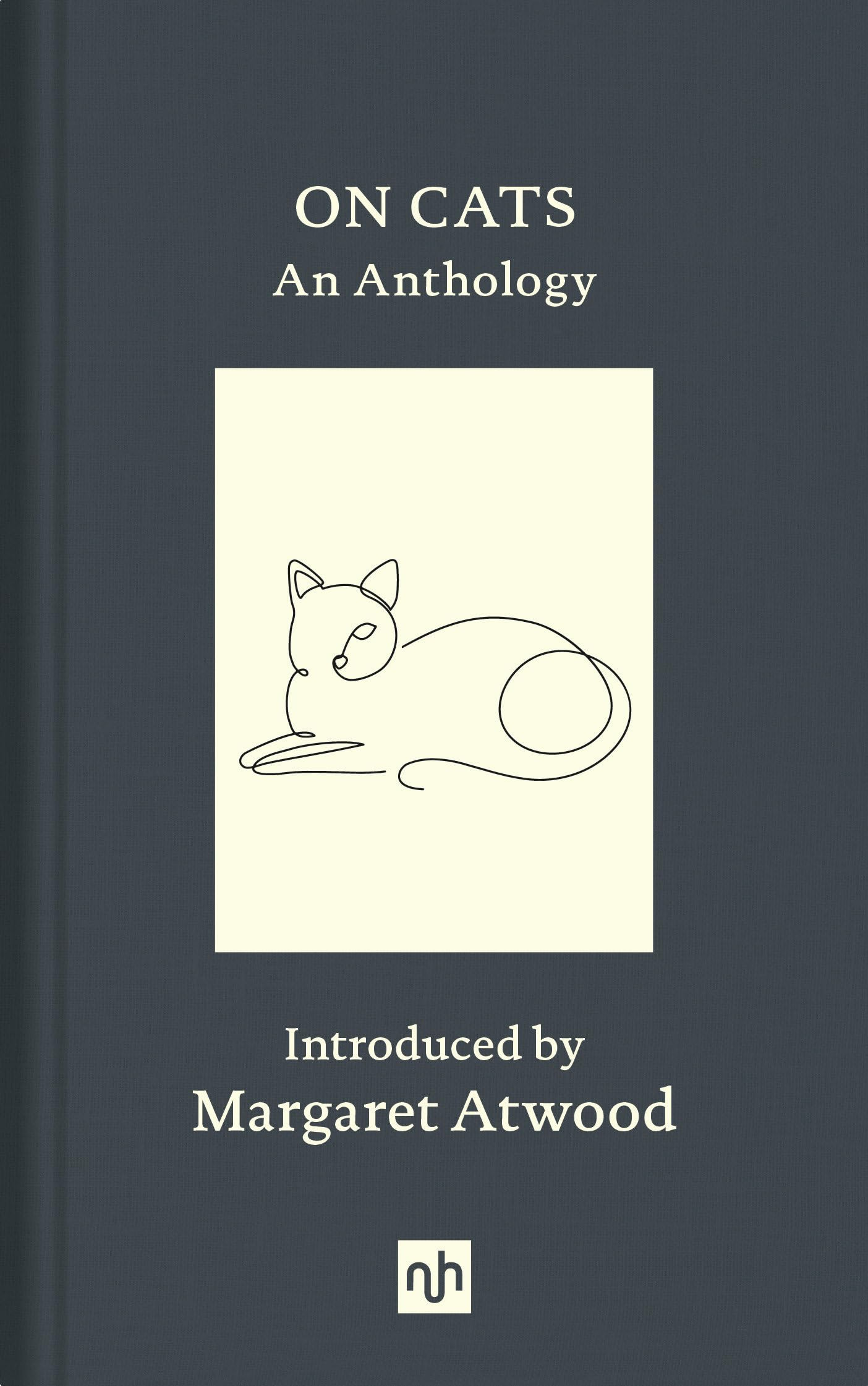Dear Global Jigsaw,
Since Sunday, our family has a cat-shaped hole at its center. After 19 years of bringing us daily joy, Caramel, was euthanized. He had been ill for almost a year, first with high blood pressure and later, cancer. By the end, he was blind and disoriented. And yet, somehow he found his kitty litter every evening, although there was diminishing bodily output over the weeks. He became skeletal, this cat who had loved nothing more than to eat.
It was Caramel who had given my husband and I, our first experience as parents. He also served as muse for two of my novels: Chinese Whiskers and Jakarta Tails. And he had the soul of a dog - loyal and giving rather than the stereotypical selfishness associated with felines. He loved food and a soft blanket. We always thought that if he could, he would have joined us at the dining table with fork and knife.
Selfie with Caramel circa 2018
Caramel’s partner is mischief, Tofu, passed in 2023. And so, when I woke up yesterday it was for the first time in two decades to a house sans a physical cat. It is very strange and I keep seeing a furry shape stretching languorously in a beam of sunshine out of the corner of my eye, or a streak of something lithe when I turn the corner into a room. But these are mere sense impressions. Phantoms of the mind. The cats are ashes. They are now metaphysical
But unlike most felines who have lived out their years on this earth, mine have a continued literary existence as the protagonists of the books that I wrote about their imagined adventures.
One, Chinese Whiskers, is about them fighting corruption in China, the other, Jakarta Tails, has them taking on a fake news network in Indonesia. Over the years they’ve had celebrity moments. A Belgian teenager once made a board game featuring Caramel and Tofu for a school project. They’ve attended book club zoom calls. And I was regularly queried about their pedigree, so fine was their countenance. In fact, their aristocratic bearing bellied their humble origins.
Julio and I had decided to adopt the cats as preparation for parenthood. By the summer of 2006, we’d been together for several years, and begun contemplating offspring - something everyone else seemed to think was a good idea - but felt like a formidable responsibility to us.
Since we lived in China at the time, we decided to go about the whole business in a quintessentially Chinese way: the pilot project. Since the days when Mao Zedong was supreme leader of the People’s Republic of China, but even more so after the wily Deng Xiaoping took over the reins, the Chinese had proceeded with economic reforms by testing the waters of any policy in a small, controlled manner, before launching it nationwide.
The best-known example of a pilot scheme were China’s special economic zones, used as early-stage troubleshooters to test regulations before opening to the global economy. The cats were to our plans of birthing little humans, what the SEZs were to China’s economic renaissance.
Moreover, cats were uniquely good testing grounds for sprogs. We would give them unconditional love, and make huge economic investments in their well-being, in return for moodiness, entitlement, and the occasional cuddle when they felt thus inclined.
We set about our task by affixing a notice on the bulletin board at the local vet’s office, asking for leads on kittens in need of homes. A day later we had an elderly lady drop by, clutching a palm-length ginger in her arms.
Her courtyard home, in the old part of the city, was only a few alleys down from us. She told us that her yard was overflowing with cats who came and went and bred and yielded a steady stream of kittens.
“Take him,” she’d said, thrusting the tiny bundle at us. And her eyes glistened with tears. “Treat him well. And if you don’t like him, bring him back to me, please.”
This lady was reborn as Nai Nai, the kindly grandmother in my novel, Chinese Whiskers, who in the story stands for traditional Chinese morality. I gave her all the best lines:
“The one who doesn’t like to read is no better than the one who cannot read,” Nai Nai said.
Adding, “Don’t you think it’s better to like what you have, than to have what you like?”
Her piece de resistance: “Fill your head rather than your pockets, and you can never be robbed.”
The counterfoil to Nai Nai in the novel, was her imagined grandson, Xiao Xu, who was emblematic of the amoral, get-rich-quick culture, that Nai Nai so abhorred.
I based him (very) loosely on the son of our landlords, a hardworking couple whose foreheads were perpetually lined with worry about the feckless ways of their only child. He was a quintessential, Little Emperor – one of a generation of only children born after China had enforced - it’s now amended - one child policy.
We named our new kitten, Caramel for the colour of his fur, but it proved almost impossible for our Chinese friends to pronounce. Our helper at the time, Li Ayi (also eventually a character in the novel) dubbed him Dou Dou, an affectionate version of soyabean, which is why in the novel Caramel is rechristened Soyabean.
The writer-cat bond is a storied one. From Colette to Murakami and T.S. Eliot, the feline muse has slunk through the alleyways of literary history, offering comfort, distraction and skepticism. Colette wrote, “Time spent with a cat is never wasted.”
Cats are creatures of selective intimacy. Their movements - limber, precise, rhythmic -seem to echo the punctuation of writing itself: commas, semicolons, exclamation marks - stalking, stillness pouncing.
I am currently reading the most delightful anthology, ON CATS, with an introduction by Margaret Atwood. Contributions include pieces by Alice Walker, Mary Gaitskill, Nikola Tesla, John Keats, Guy du Maupassant and many more.
Atwood concludes her essay about moving on from a long period of mourning her beloved feline, Blackie, with the decision to allow new kittens into her life. She imagines the experience: I will have cat hammocks. I will have scratching posts. I will not allow myself to be distressed by shredded upholstery. If I am going to be a mad old lady with a witchy reputation I may as well equip myself with a couple of trusted familiars. Company as one flies through the air on one’s broom, wouldn’t you say?
In my case, my earliest writerly memory of Caramel is less of inspiration and more of desperation. As a two month old kitten he endangered the manuscript of my debut book by jumping onto my laptop keyboard and digging up the individual keys in search of a tiny bug he’d been trying to chase. My cocktail of a response - rage, amusement, despair, resignation, all tempered by love - was to become my emotional uniform for the next decade as my boys, Ishaan and Nico were born in quick succession.
Caramel had a great innings, spread over the five countries that he called home. We are soon returning to the country of his (and Tofu’s) birth, China, and our only regret is that he did not make it back to close the circle. We will take his ashes with us and let a fine breeze on a fall evening in Beijing carry them where it will. Zai jian, Caramel. Hasta luego.
Thank you for reading. Do share this post, comment and if possible, upgrade to a paid membership to support this publication. Hugs,
Pallavi






So glad you wrote this beautiful eulogy for dearest Caramel
Hi Pallavi. So so sorry for the loss of Caramel. And those visions of seeing him from the corner of your eye mean he is visiting. That is what we were taught in our animal communication course.
They take a piece of your soul when they go but am sure he will be with you in spirit. Take care.